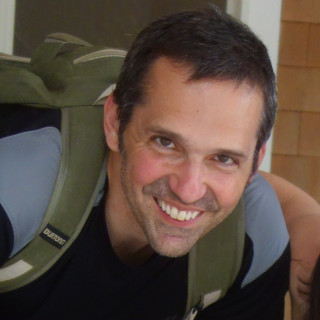
I can sum up my medical school experience in one word.
Lusitrope.
Let me explain.
If indeed Ambrose Bierce is correct that learning is the kind of ignorance that distinguishes the studious, then let me offer myself as an example.
Questions of personal identity aside, I would have the reader imagine him or herself, in this age of "returning to school," doing just that. Imagine yourself, at your age, and your acquired wisdom level, returning to medical school. I was somewhere in my 30s when I less returned to than started medical school, with a previous, if brief, teaching career in which I was addressed with at least a modicum of respect as "Mister." Granted, this career, even at my (relatively) advanced age, a result of terminal graduate education, was only a few years long, but any job post-grad school will make one feel human again.
I will forego detailing the relentlessly de-humanizing experience of a medical school education at an age when one can plainly see the shortcomings of one's teachers and peers. But I will share one story to illustrate how the intellectual freedom I had formerly enjoyed in a field that rewarded speculation was squashed in my newly chosen field of medicine.
Briefly, I was a third-year medical student. For the uninitiated, it used to be that medical school curricula were fairly standardized. Two years in the classroom; (pay your exorbitant fee and) take the classroom test. Then two years "on the wards;" (pay your exorbitant fee times two and) take the clinical tests. "Classes" in the third and fourth years, as many of us know, are referred to as "rotations." These are standardized blocks of time with the names of familiar medical specialties: medicine, Surgery, Gynecology, Psychiatry. The third year is filled with required rotations; the fourth year with electives. Educationally these are what one makes of them. As the student on the team it is easy enough to hide, or shine, and one can learn as much, or as little, as one wants. Regardless, like any other graduate school class, everyone gets a generally high passing grade just for showing up.
I showed up every day, so I did okay.
Anyway, I was rotating through the intensive care unit, and during morning rounds one day the Critical Care attending physician entered into an unexpectedly heated argument with the Cardiac Care attending physician over, of all things, the etymology of the word "lusitrope."
A somewhat archaic term, even by medical standards, a lusitrope is a medication, or other treatment, that slows down an overworked heart. I cannot recall how it even came up, but the question was tossed out there as to where the word came from. The Critical Care attending, who was leading the rounds, of course had the answer without skipping a beat. He waxed on and on and on, about how the term was derived from the name of the wife of an old professor of his, a man with whom he had spent much time on the golf courses in the suburbs of Chicago, whose wife's name, as one might guess, was "Lucy." He said this in all earnestness.
The Cardiac Care attending, who happened to overhear this understandably baffling explanation, immediately interrupted, shouting out, for all to hear, just how ridiculous an explanation that was. It was, of course, perfectly obvious, to him, that the word came from the Latin word for "calcium channel blocker" (I'm not kidding), "lusus" (or something like that). These two attending physicians, the local power-brokers who could potentially make or break any of our futures, then started laying bets. Cash bets.
Keep in mind there was quite the audience in attendance. There were at least six or seven resident physicians as well as Pulmonary and Cardiology fellows about, and two or three medical students, not to mention any number of nurses, technicians, dietitians, pharmacists, therapists, maintenance staff, IT staff, and patients. But these two alphas took center stage, one blowing harder than the other, neither even thinking to ask anyone else for an opinion or thought.
Now, here is the crazy thing.
What made this argument especially interesting to me was that before medical school I had been an all-but-dissertated doctoral candidate in the Department of Near Eastern Languages and Cultures at a major research university. My specialty was comparative ancient philology. In other words, I was trained as an expert in ancient languages. In fact, I had taught numerous college and graduate-level courses on related subjects. From my former training, I understood very well the likely etymology of "lusitrope."
Was I about to contradict either of my two bosses at the moment?
Hell. No. Not me.
But. That said. One of the Cardiology fellows with whom I was friendly unwittingly threw my paper hat into the ring. He piped in, to my mortal chagrin, that "Elliott (though in his thick Bengali accent it came out more like 'Idiot') is a scholar of Greek and Latin." He implied thereby that I might be able to settle the argument. For a brief moment, there was silence, and all eyes turned expectantly to me. I waited wordlessly for a moment, hoping a patient would have a cardiac arrest or stroke or something…But no such luck, and I had no choice at that point.
A former teacher, I quietly demonstrated, rather eloquently, so I thought, that the word "lusitrope" was, like most archaic medical terms, hardly a naturally occurring Greek or Latin word, but a likely pseudo-scholarly mishmash of two Greek roots, "lusis" and "tropos," lusis meaning "a loosening or relaxing," and tropos meaning "a bend, or inclination." Therefore, a lusitrope was, one could infer with some confidence, something that "tended to loosen or relax."
I also explained, with a purposefully pointed irony – either missed or ignored (almost certainly missed) – that there was indeed a Latin word "lusus." Only it did not mean "calcium channel blocker"; it meant "freak" or "monster."
No response to that.
Then, just for giggles, I confabulated, "It was also the first person present plural form of the verb, 'to be intellectually stunted.'"
Both of these attendings mused silently for a full eight seconds or more, thinking it through, before translating out loud in unison, "So, we are...intellectually...stunted?"
Touché.
The former teacher in me nearly patted the tops of their heads with well-earned condescension and a "Good job!"
What does a medical student know, after all? It was as if I had never spoken, as if, really, I did not even exist.
Elliott Martin, MD, is a board-certified adult and child psychiatrist at Newton-Wellesley Hospital, as well as the Director of Consultation and Emergency Psychiatric Services at Newton-Wellesley Hospital, and Assistant Clinical Professor of Psychiatry at Tufts University School of Medicine. He is a 2018–19 Doximity Author.







